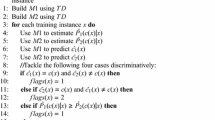Abstract
Naive Bayes is often used in text classification applications and experiments because of its simplicity and effectiveness. However, its performance is often degraded because it does not model text well, and by inappropriate feature selection and the lack of reliable confidence scores. We address these problems and show that they can be solved by some simple corrections. We demonstrate that our simple modifications are able to improve the performance of Naive Bayes for text classification significantly.
Preview
Unable to display preview. Download preview PDF.
Similar content being viewed by others
References
Sahami, M., Dumais, S., Heckerman, D., Horvitz, E.: A Bayesian approach to filtering junk e-mail. In: Learning for Text Categorization: Papers from the AAAI Workshop, Madison Wisconsin, pp. 55–62. AAAI Press, Menlo Park (1998); Technical Report WS-98-05
Androutsopoulos, I., Paliouras, G., Karkaletsis, V., Sakkis, G., Spyropoulos, C.D., Stamatopoulos, P.: Learning to filter spam e-mail: A comparison of a Naive Bayesian and a memory-based approach. In: Zaragoza, H., Gallinari, P., Rajman, M. (eds.) Proc. Workshop on Machine Learning and Textual Information Access, 4th European Conference on Principles and Practice of Knowledge Discovery in Databases (PKDD), Lyon, France, pp. 1–13 (2000)
Lang, K.: NewsWeeder: Learning to filter netnews. In: Proc. 12th International Conference on Machine Learning (ICML 1995), pp. 331–339. Morgan Kaufmann, San Francisco (1995)
Pazzani, M., Billsus, D.: Learning and revising user profiles: The identification of interesting web sites. Machine Learning 27, 313–331 (1997)
Koller, D., Sahami, M.: Hierarchically classifying documents using very few words. In: 14th International Conference on Machine Learning (ICML 1997), pp. 170–178 (1997)
Cohen, W.W., Singer, Y.: Context-sensitive learning methods for text categorization. ACM Transactions on Information Systems 17, 141–173 (1999)
McCallum, A., Nigam, K.: A comparison of event models for Naive Bayes text classification. In: Learning for Text Categorization: Papers from the AAAI Workshop, pp. 41–48. AAAI Press, Menlo Park (1998); Technical Report WS-98-05
Yang, Y., Liu, X.: A re-examination of text categorization methods. In: Proc. 22nd Annual International ACM SIGIR Conference on Research and Development in Information Retrieval (SIGIR 1999), pp. 42–49 (1999)
Mitchell, T.M.: Machine Learning. McGraw-Hill, New York (1997)
Joachims, T.: Text categorization with support vector machines: Learning with many relevant features. In: Nédellec, C., Rouveirol, C. (eds.) ECML 1998. LNCS, vol. 1398, pp. 137–142. Springer, Heidelberg (1998)
Craven, M., DiPasquo, D., Freitag, D., McCallum, A., Mitchell, T., Nigam, K., Slattery, S.: Learning to construct knowledge bases from the World Wide Web. Artificial Intelligence 118, 69–113 (2000)
Katz, S.M.: Distribution of content words and phrases in text and language modelling. Natural Language Engineering 2, 15–59 (1996)
Domingos, P., Pazzani, M.: On the optimality of the simple Bayesian classifier under zero-one loss. Machine Learning 29, 103–130 (1997)
Friedman, J.H.: On bias, variance, 0/1-loss, and the curse-of-dimensionality. Data Mining and Knowledge Discovery 1, 55–77 (1997)
Mladenić, D., Grobelnik, M.: Word sequences as features in text-learning. In: Proc. 17th Electrotechnical and Computer Science Conference (ERK 1998), Ljubljana, Slovenia (1998)
Gómez-Hidalgo, J.M., de Buenaga Rodríguez, M.: Integrating a lexical database and a training collection for text categorization. In: ACL/EACL 1997 Workshop on Automatic Information Extraction and Building of Lexical Semantic Resources for NLP Applications, pp. 39–44 (1997)
Dhillon, I.S., Mallela, S., Kumar, R.: A divisive information-theoretic feature clustering algorithm for text classification. Journal of Machine Learning Research 3, 1265–1287 (2003)
Torkkola, K.: Linear discriminant analysis in document classification. In: IEEE ICDM 2001 Workshop on Text Mining (TextDM 2001), San Jose, CA (2001)
Rennie, J.D.M., Shih, L., Teevan, J., Karger, D.: Tackling the poor assumptions of Naive Bayes text classifiers. In: Fawcett, T., Mishra, N. (eds.) Proceedings of the Twentieth International Conference on Machine Learning (ICML 2003), Washington, D.C, pp. 616–623. AAAI Press, Menlo Park (2003)
Kim, S.B., Rim, H.C., Yook, D., Lim, H.S.: Effective methods for improving Naive Bayes text classifiers. In: Ishizuka, M., Sattar, A. (eds.) PRICAI 2002. LNCS (LNAI), vol. 2417, pp. 414–423. Springer, Heidelberg (2002)
Eyheramendy, S., Lewis, D.D., Madigan, D.: On the Naive Bayes model for text categorization. In: Bishop, C.M., Frey, B.J. (eds.) AI & Statistics 2003: Proceedings of the Ninth International Workshop on Artificial Intelligence and Statistics, pp. 332–339 (2003)
Yang, Y., Pedersen, J.O.: A comparative study on feature selection in text categorization. In: Proc. 14th International Conference on Machine Learning (ICML 1997), pp. 412–420 (1997)
Forman, G.: An extensive empirical study of feature selection metrics for text classification. Journal of Machine Learning Research 3, 1289–1305 (2003)
Cover, T.M., Thomas, J.A.: Elements of Information Theory. John Wiley, New York (1991)
Bennett, P.N.: Assessing the calibration of Naive Bayes’ posterior estimates. Technical Report CMU-CS-00-155, School of Computer Science, Carnegie Mellon University (2000)
Apté, C., Damerau, F., Weiss, S.M.: Towards language independent automated learning of text categorization models. In: Proc. 17th ACM SIGIR Conference on Research and Development in Information Retrieval (SIGIR 1994), pp. 23–30 (1994)
Author information
Authors and Affiliations
Editor information
Editors and Affiliations
Rights and permissions
Copyright information
© 2005 Springer-Verlag Berlin Heidelberg
About this paper
Cite this paper
Schneider, KM. (2005). Techniques for Improving the Performance of Naive Bayes for Text Classification. In: Gelbukh, A. (eds) Computational Linguistics and Intelligent Text Processing. CICLing 2005. Lecture Notes in Computer Science, vol 3406. Springer, Berlin, Heidelberg. https://doi.org/10.1007/978-3-540-30586-6_76
Download citation
DOI: https://doi.org/10.1007/978-3-540-30586-6_76
Publisher Name: Springer, Berlin, Heidelberg
Print ISBN: 978-3-540-24523-0
Online ISBN: 978-3-540-30586-6
eBook Packages: Computer ScienceComputer Science (R0)




